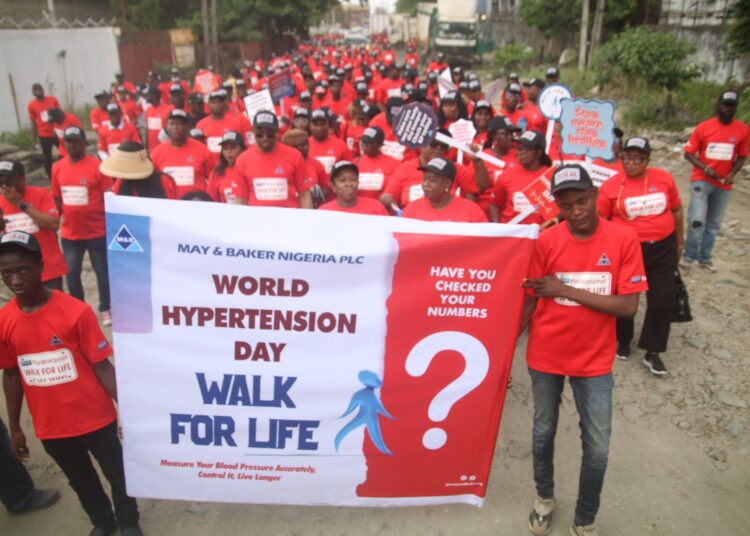The managing director/CEO of May & Baker Nigeria Plc, Patrick Ajah, has called on the federal government to ensure consistency and financial accountability in the implementation of its newly launched MediPool initiative, a public-private procurement mechanism aimed at lowering the cost of essential medicines and boosting local pharmaceutical production.
Ajah made the remarks during the “Walk for Life” awareness event organised by May & Baker Nigeria Plc to commemorate World Hypertension Day, in Lagos.
He used the platform to shed light on the rising burden of hypertension in Nigeria, the challenges of affordability in treatment, and the critical role local pharmaceutical companies play in health care sustainability.
Special guests at the event include the director of Medical Services, Health, and Safety at LAWMA, Dr. Modupe Okoh; Officials from Ikeja LGA; Medical Officer of Health (MOH) and Director Planing, Research and Statistics (DPRS) Health District VI,
Dr Folashade Tawak; Deputy Director Community Health Service for Ikeja LGA, Mrs Olusola Adenariwo; Director, Health Education Unit Health District VI, Mrs Adeseun; Principal Environmental/ Occupational Health and Safety Officer, LSG, Mrs Olakunmi Agboibon along with other representatives from the Ministry of Health Lagos.
As Nigeria grapples with rising health challenges amid economic constraints, stakeholders like May & Baker are sounding the alarm: public health strategies must go hand-in-hand with economic sustainability and government accountability to truly make healthcare affordable for all.
“Many Nigerians are walking around unaware they have dangerously high blood pressure. Sudden deaths and heart attacks are on the rise, yet routine medical checkups are not common practice. People only get checked when they fall seriously ill. That’s why awareness like today is so crucial,” Ajah stated.
However, Ajah emphasised that increased awareness must be matched with access to affordable medications, an area where Nigerian pharmaceutical companies face significant challenges.
“Most hypertensive patients require lifelong medication, but affordability has become a huge barrier. With the devaluation of the naira, the cost of raw materials—often imported in dollars—has skyrocketed. Even though May & Baker and others strive to produce affordable alternatives, many Nigerians still can’t afford these drugs,” he explained.
In this context, the MediPool initiative, recently approved by the Federal Executive Council, is a welcome intervention. Designed as a pooled procurement platform, MediPool will use the government’s purchasing power to negotiate lower prices for essential medicines and stimulate local production. It will begin with the Basic Health Care Provision Fund and extend to federal tertiary hospitals, ultimately aiming to reduce Nigeria’s dependence on imported pharmaceuticals.
While commending the government’s vision, Ajah issued a strong caution on execution. “I am part of the pool procurement committee, and my main concern is consistency. In the past, companies like ours were involved in similar government-led initiatives but were never paid. I am talking about payments that have been hanging for over five years. That kind of uncertainty discourages manufacturers,” he warned.
Ajah stressed that sustainability depends on trust and financial responsibility from the government. “You can’t ask us to slash prices, compromise our profits, and then delay payments. It will collapse the system. Already, many local pharmaceutical companies are shutting down,” he said.
He also praised the federal government’s recent executive order waiving import duties on raw materials for drug production, a move he described as “fantastic” and “very impactful,” estimating that companies could save tens of millions of naira per container.
“That duty waiver alone has made many of us slow down on our planned price increases despite FX pressures. It shows what government support can achieve if implemented well,” he noted.
Ajah further encouraged the government to expand and consistently implement such policies to foster a stable environment for local manufacturers. “If you want to build the capacity for local pharmaceutical production and reduce reliance on imports, then the right policies must not only be enacted, they must be seen through,” he said.
He also urged the public to adopt preventive health measures, especially those aged 40 and above. “Know your numbers. Yearly checkups, healthy eating, and early intervention are key. Once hypertension sets in, the management becomes long-term,” he advised.
We’ve got the edge. Get real-time reports, breaking scoops, and exclusive angles delivered straight to your phone. Don’t settle for stale news. Join LEADERSHIP NEWS on WhatsApp for 24/7 updates →
Join Our WhatsApp Channel










